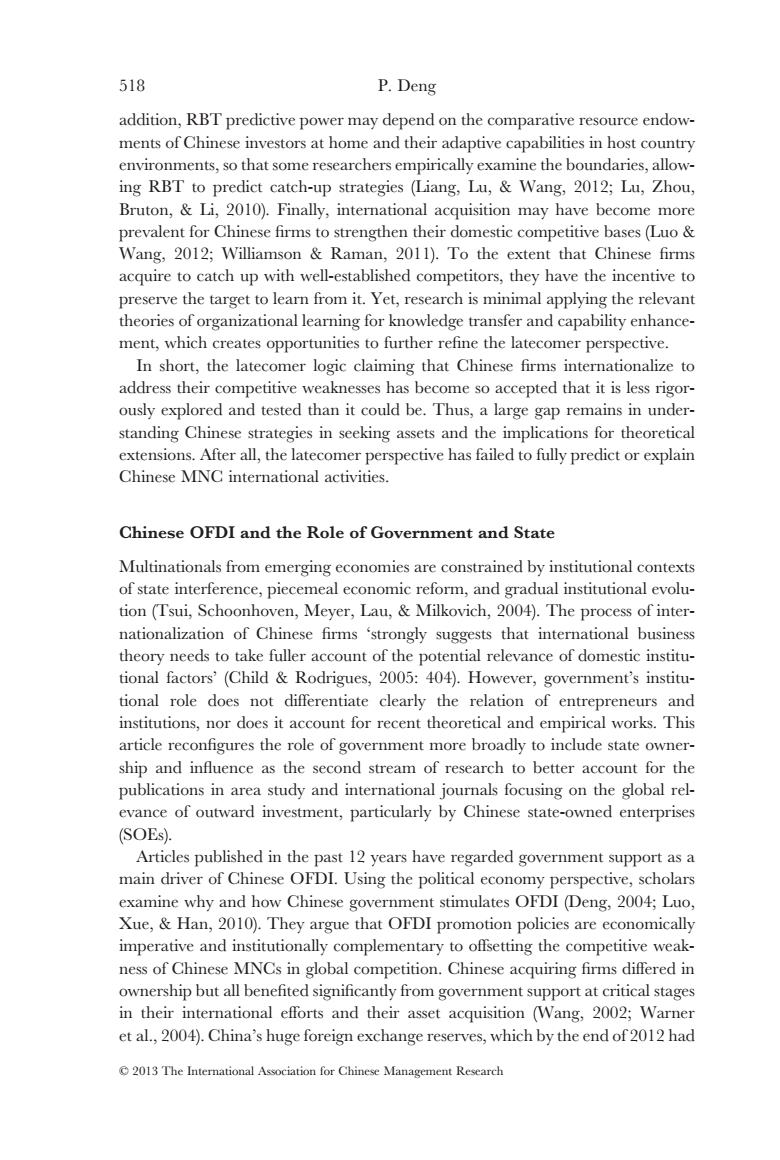正在加载图片...

518 P.Deng addition,RBTpredictive power may depend on the comparative resource endow- ments of Chinese investors at home and their adaptive capabilities in host country environments,so that some researchers empirically examine the boundaries,allow- ing RBT to predict catch-up strategies (Liang,L,Wang,2012;L,Zhou Bruton,&Li,2010).Finally,international acquisition may have become more prevalent for Chinese firms to strengthen their domestic competitive bases(Luo Wang,2012;Williamson Raman,2011).To the extent that Chinese firms acquire to catch up with well-established competitors,they have the incentive to preserve the target to learn from it.Yet,research is minimal applying the relevan theories of organizational learning for knowledge transfer and capability enhance- ment,which creates opportunities to further refine the latecomer perspective. In short,the lateco mer logic claiming that Chinese firms inte tionalize to address their competitive weaknesses has become so accepted that it is less rigor ously explored and tested than it could be.Thus,a large gap remains in under- standing Chinese strategies in seeking assets and the implications for theoretical perspective has failed to fully predict or explain Chinese OFDI and the Role of Government and State Multinationals from emerging economies are constrained by institutional contexts of state interference,piecemeal economic reform,and gradual institutional evolu- tion (Tsui,Schoonhoven,Meyer,Lau,Milkovich,2004).The process of inter- nationalization of Chinese firms 'strongly suggests that international business theory needs to take fuller account of the potential relevance of domestic institu- tional factors'(Child Rodrigues,2005:404).However,government's institu- tional role does not differentiate clearly the relation of entrepreneurs and does theoretical and emprical works Thi article reconfigures the role of government more broadly to include state owner- ship and influence as the second stream of research to better account for the publications in area study and international journals focusing on the global rel evance of outward investment,particularly by Chinese state-owned enterprises (SOEs). Articles published in the past 12 years have regarded government support as a main driver of Chinese OFDI Using the political economy perspectiv scholars examine why and how Chinese government stimulates OFDI(Deng,2004;Luo. Xue,Han,2010).They argue that OFDI promotion policies are economically imperative and institutionally complementary to offsetting the competitive weak- ness of Chinese MNCs in global competition.Chinese acquiring firms differed in ownership but all benefited significantly from government support at critical stages in their international efforts and their asset acquisition(Wang,2002;Warner et al.,2004).China's huge foreign exchange reserves,which by the end of 2012 had 2013 The International Asociation for Chinese Management Researchaddition, RBT predictive power may depend on the comparative resource endowments of Chinese investors at home and their adaptive capabilities in host country environments, so that some researchers empirically examine the boundaries, allowing RBT to predict catch-up strategies (Liang, Lu, & Wang, 2012; Lu, Zhou, Bruton, & Li, 2010). Finally, international acquisition may have become more prevalent for Chinese firms to strengthen their domestic competitive bases (Luo & Wang, 2012; Williamson & Raman, 2011). To the extent that Chinese firms acquire to catch up with well-established competitors, they have the incentive to preserve the target to learn from it. Yet, research is minimal applying the relevant theories of organizational learning for knowledge transfer and capability enhancement, which creates opportunities to further refine the latecomer perspective. In short, the latecomer logic claiming that Chinese firms internationalize to address their competitive weaknesses has become so accepted that it is less rigorously explored and tested than it could be. Thus, a large gap remains in understanding Chinese strategies in seeking assets and the implications for theoretical extensions. After all, the latecomer perspective has failed to fully predict or explain Chinese MNC international activities. Chinese OFDI and the Role of Government and State Multinationals from emerging economies are constrained by institutional contexts of state interference, piecemeal economic reform, and gradual institutional evolution (Tsui, Schoonhoven, Meyer, Lau, & Milkovich, 2004). The process of internationalization of Chinese firms ‘strongly suggests that international business theory needs to take fuller account of the potential relevance of domestic institutional factors’ (Child & Rodrigues, 2005: 404). However, government’s institutional role does not differentiate clearly the relation of entrepreneurs and institutions, nor does it account for recent theoretical and empirical works. This article reconfigures the role of government more broadly to include state ownership and influence as the second stream of research to better account for the publications in area study and international journals focusing on the global relevance of outward investment, particularly by Chinese state-owned enterprises (SOEs). Articles published in the past 12 years have regarded government support as a main driver of Chinese OFDI. Using the political economy perspective, scholars examine why and how Chinese government stimulates OFDI (Deng, 2004; Luo, Xue, & Han, 2010). They argue that OFDI promotion policies are economically imperative and institutionally complementary to offsetting the competitive weakness of Chinese MNCs in global competition. Chinese acquiring firms differed in ownership but all benefited significantly from government support at critical stages in their international efforts and their asset acquisition (Wang, 2002; Warner et al., 2004). China’s huge foreign exchange reserves, which by the end of 2012 had 518 P. Deng © 2013 The International Association for Chinese Management Research